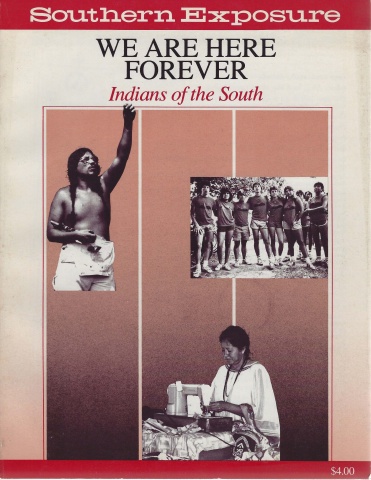New Orleans

This article originally appeared in Southern Exposure Vol. 13 No. 6, "We Are Here Forever: Indians of the South." Find more from that issue here.
This is the south. I look for evidence
of other Creeks, for remnants of voices,
or for tobacco brown bones to come wandering
down Conti Street, Royale, or Decatur.
Near the French Market I see a blue horse
caught frozen in stone in the middle of
a square. Brought in by the Spanish on
an endless ocean voyage he became mad
and crazy. They caught him in blue
rock, said
don't talk.
I know it wasn't just a horse
that went crazy.
Nearby is a shop with ivory and knives.
There are red rocks. The man behind the
counter has no idea that he is inside
magic stones. He should find out before
they destroy him. These things
have memory,
you know.
I have a memory.
It swims deep in blood,
a delta in the skin. It swims out of Oklahoma,
deep the Mississippi River. It carries my
feet to these places: the French Quarter,
stale rooms, the sun behind thick and moist
clouds, and I hear boats hauling themselves up
and down the river.
My spirit comes here to drink.
My spirit comes here to drink.
Blood is the undercurrent.
There are voices buried in the Mississippi
mud. There are ancestors and future children
buried beneath the currents stirred up by
pleasure boats going up and down.
There are stories here made of memory.
I remember DeSoto. He is buried somewhere in
this river, his bones sunk like the golden
treasure he traveled half the earth to find,
came looking for gold cities, for shining streets
of beaten gold to dance on with silk ladies.
He should have stayed home.
(Creeks knew of him for miles
before he came into town.
Dreamed of silver blades
and crosses.)
And knew he was one of the ones who yearned
for something his heart wasn't big enough
to handle.
(And DeSoto thought it was gold.)
The Creeks lived in earth towns,
not gold,
spun children, not gold.
That's not what DeSoto thought he wanted to see.
The Creeks knew it, and drowned him in
the Mississippi River
so he wouldn't have to drown himself.
Maybe his body is what I am looking for
as evidence. To know in another way
that my memory is alive.
But he must have got away, somehow,
because I have seen New Orleans,
the lace and silk buildings,
trolley cars on beaten silver paths,
graves that rise up out of soft earth in the rain,
shops that sell black mammy dolls
holding white babies.
And I know I have seen DeSoto,
having a drink on Bourbon Street,
mad and crazy
dancing with a woman as gold
as the river bottom.
Tags
Joy Harjo
Joy Harjo is a Creek who comes from Tulsa. She is working on her third collection of poetry. This poem is reprinted with her permission from She Had Some Horses, published by Thunder's Mouth Press. (1985)